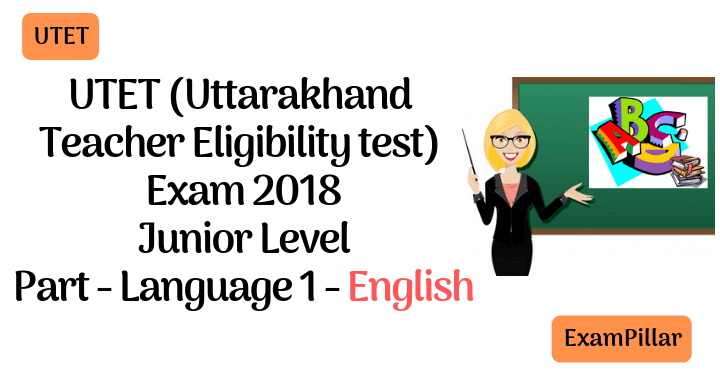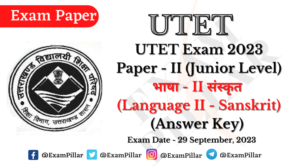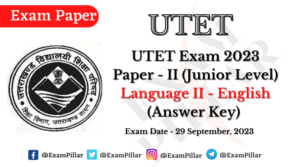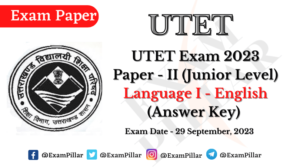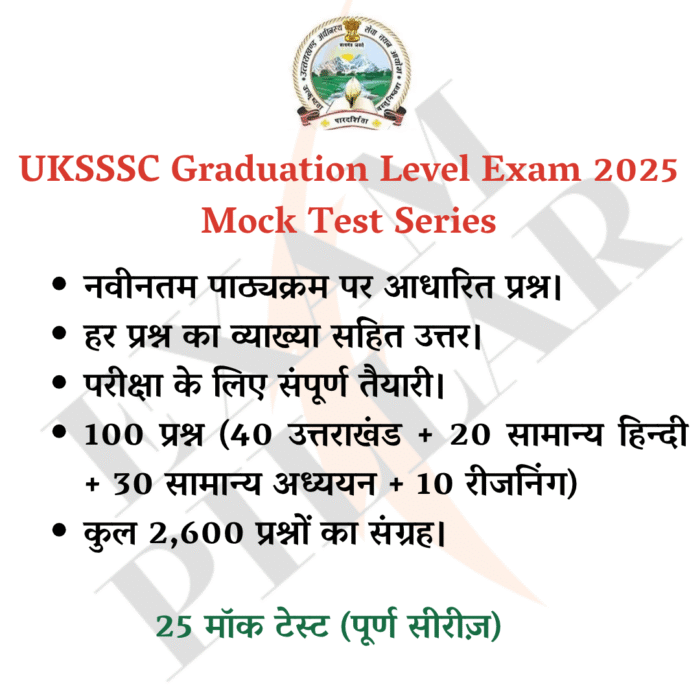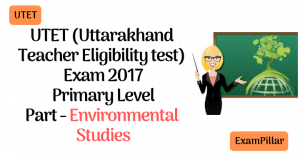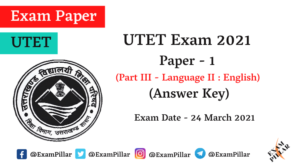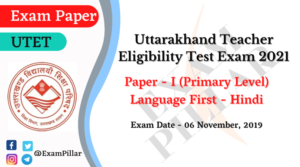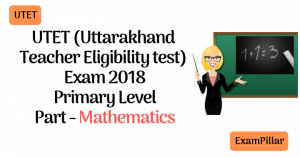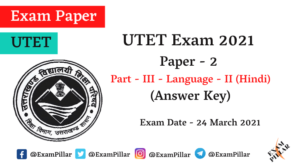उत्तराखंड विद्यालयी शिक्षा परिषद् (UBSE – Uttarakhand Board of School Education) द्वारा 14 दिसम्बर 2018 को UTET (Uttarakhand Teachers Eligibility Test) परीक्षा का आयोजन किया गया। UTET (Uttarakhand Teachers Eligibility Test) Exam Paper 2018 – Language First – English की उत्तरकुंजी (Language – 1 (English) Part Answer Key).
UTET (Uttarakhand Teachers Eligibility Test) Junior Level
(Class 6 to Class 8).
परीक्षा (Exam) : UTET (Uttarakhand Teachers Eligibility Test)
भाग (Part) : Language – First (English)
परीक्षा आयोजक (Organized) : UBSE
कुल प्रश्न (Number of Question) : 30
Paper Set – C
परीक्षा तिथि (Exam Date) – 14th Dec 2018
UTET Exam 2018
Paper – 2 (Junior Level)
Language – First (English)
Direction (Q. No. 1) : Change the degree of the underlined adjective into positive degree without changing the meaning of the sentence and select the appropriate option for that.
1. Mumbai is one of the richest cities in India.
(A) Mumbai is one of the rich city in India.
(B) Mumbai is among one of the rich cities in India.
(C) No other city in India is as rich as Mumbai.
(D) Very few cities in India are as rich as Mumbai.
Show Answer/Hide
Direction (Q. No. 2 – 3) : In the following questions choose the appropriate active voice from the given options.
2. The theatre was opened only last month.
(A) They opened the only theatre last month.
(B) They opened the theatre only last month.
(C) They had opened the theatre only last month.
(D) They had been opened the theatre only last month.
Show Answer/Hide
3. He will be greatly surprised if he is chosen.
(A) It will greatly surprise him if they choose him.
(B) It will greatly surprise them if they choose him.
(C) It will be greatly surprise him if they choose him.
(D) It will greatly be surprise him if they choose him.
Show Answer/Hide
Direction (Q. No. 4) : In the following question select the most suitable option for the direct narration.
4. He proposed that they should wait for the award.
(A) He said, “We should wait for the award”.
(B) He said, “You should wait for the award”.
(C) He said, “Let them wait for the award”.
(D) He said , “Let us wait for the award”.
Show Answer/Hide
Direction (Q.No. 5) : In the following sentence omit ‘too’ without changing its meaning and select the appropriate option for that.
5. The house is too large, not to be able to accomodate everybody.
(A) The house is so large that it will not be able to accomodate everybody.
(B) The house is not so large that it will be able to accomodate everybody.
(C) The house is so large that it will be able to accomodate everybody.
(D) The house is so larger that it will be able to accomodate everybody. :
Show Answer/Hide
Direction (Q. No. 6): Select the word nearest in meaning to underlined part.
6. The resignation of Chief Minister is intriguing.
(A) Secret
(B) interesting
(C) curious
(D) diplomatic
Show Answer/Hide
Direction (Q. No. 7 – 10): Read the passage given below and answer the questions that follow by selecting the most appropriate option.
Stammering is a habit disorder linked with lack of self-confidence. Basically, for a child to understand a language, there are four stages. The first is learning to understand the spoken language and second is speaking. Both of these usually develop around the age of two. The third stage is speaking complex sentences, which develops at around 3rd and the fourth , is when the child recognises the written alphabet. In 80% of children while the 3rd and 4th stages are at play, the first two get disturbed because something new is being incorporated in the mind. This is absolutely normal. But what over cautious mothers do is fret a lot and the child develops a fear which later manifests itself as stammering. In fact, most text books on stammering state in bold that, “Had there not been any over cautious mothers, hardly any one would have-suffered from stammering.” Fluency can be incorporated in the speech of such patients through hypnosis.
7. Stammering is caused because of –
(A) Physical disorder
(B) Hindered growth
(C) Lack of self confidence
(D) Lack of understanding
Show Answer/Hide
8. The second stage of a Child’s understanding the language is –
(A) Speaking
(B) Writing
(C) Listening
(D) Reading
Show Answer/Hide
9. ________ are basically the reason for developing a fear in child’s mind-
(A) Parents
(B) Over cautious mothers
(C) Fathers
(D) Teachers
Show Answer/Hide
10. Fluency in such patients can be incorporated in the speech of such patients through –
(A) Hypnosis
(B) Slap
(C) Punishment
(D) Symbiosis
Show Answer/Hide
Direction (Q. No. 11 – 14): Read the poem given below and answer the questions that follow by selecting the most appropriate option.
How happy is he born or taught
That serveth not another’s will;
Whose armour is his honest thought,
And simple truth his utmost skill;
Whose passions not his master are,
Whose soul is still prepared for death;
Untied unto the world with care,
Of princely love or vulgar breath;
Who hath his life from rumours freed,
Whose conscience is his strong retreat;
Whose state can neither flatterers feed,
Nor ruin make oppressors great;
Who envies none whom chance doth raise
Nor vice; who never understood
How deepest wounds are given with praise;
Nor rules of state, but rules of good;
Who God doth late and early pray
More of his grace than gifts to lend;
Who entertains the harmless day
With a well chosen book or friend;
This man is free from servile bands
Of hope to rise, or fear to fall;
Lord of himself, though not of lands;
And having nothing, he hath all.
11. In this poem the poet tells the qualities of –
(A) A happy man
(B) An honest man
(C) An ordinary man
(D) A religious man
Show Answer/Hide
12. In this poem the life of the man is free from –
(A) Peace
(B) Rumours
(C) Rest
(D) Force
Show Answer/Hide
13. In this poem the man prays to God for
(A) His grace
(B) Precious gifts
(C) Joyful life
(D) Good friends
Show Answer/Hide
14. Point out the figure of speech in the line, “And having nothing, he hath all”.
(A) Personification
(B) Simile
(C) Metaphor
(D) Oxymoron
Show Answer/Hide
15. Fluency in English can be developed through –
(A) Creating opportunities to use the target language for communication.
(B) The teacher talking for most of the time.
(C) The teacher being alert to spot the errors and correct them.
(D) Allowing students who are not confident to have the freedom to be quiet.
Show Answer/Hide

